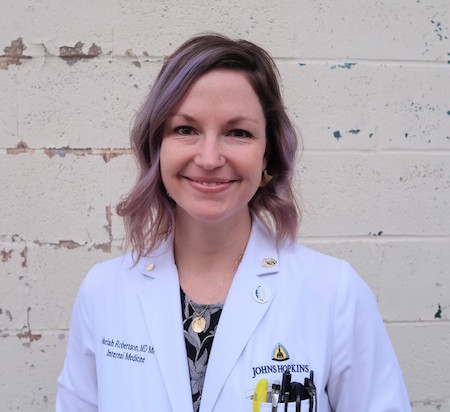Takeaway
The onus may be on the clinically excellent doctor to overcome a the patient's disability that interferes with care. A pocket talker can make a big difference for patients with hearing impairment.

Connecting with Patients | October 8, 2019 | 4 min read
By Mariah Robertson, MD, Johns Hopkins Medicine
We were out on routine home visits with our homebound older adult patients through the Johns Hopkins JHOME program. When we walked into our patient’s room she was resting in bed, eyes closed. She appeared to be frail, tired, and completely disengaged from her surroundings. A TV played in the background, but it was clear she was not watching, possibly not interested, possibly not able to understand. My resident reached out, touched her hand, and introduced herself. The patient opened her eyes and looked at her with confusion, a flat expression.
“Do you mind if I put these on your ears?” the resident asked kindly.
Our patient nodded. It was a “pocket talker,” or sound amplification device. We carry them with us on home visits in case a patient is hard of hearing. My resident gently placed the headphones on the patient and turned on the device. She spoke into the microphone and instantly the patient’s eyes lit up.
It was incredible to watch our patient from that point forward. She had a laugh so infectious that we were all smiling by the end of the visit. We learned a great deal from our patient that day. We learned that she is falling more because she thinks she can get out of bed and can’t always grab the attention of her family in the next room. We learned that she sleeps much of the day and effective because her senses are dulled and it is work to be able to interact normally. We learned she isn’t nearly as demented or debilitated as one might initially think. A $40 device changed an entire interaction. This is just one of many examples where hearing loss has been profoundly detrimental to the care and to the health of my patients during my short three months as a geriatrics fellow.
It wasn’t surprising to read the article on NPR which explored this phenomenon. In the NPR article, they follow a woman who has hearing impairment and shares her experiences and feelings of isolation because she can’t hear well. The article goes on to tie hearing loss to loneliness, which is an epidemic among our older adults in the United States. The article highlights several key studies that have shown connections between hearing loss and some of the most devastating diseases facing our older adult populations.
Studies estimate that nearly 38 million people in the US suffer from hearing loss. Research conducted by Dr. Frank Lin, an otolaryngologist at Hopkins, and his colleagues, have shown that untreated hearing loss increases the risk for dementia (50%), depression (40%), and falls (30%) over a ten-year period of time. In my early career as a geriatrician, it was surprising to realize that despite the staggering effects of hearing loss, Medicare does not cover hearing aid devices. Unless you are a veteran and have VA services, it will cost several thousand dollars out of pocket to be able to improve hearing with traditional hearing aids.
Even more surprising is the fact that often patients with hearing aids still struggle with difficulty hearing, accessory noises, and background sound. It is also common for patients to deliberately leave their hearing devices at home when they come to the hospital for fear that they may lose them during their time inpatient. They are often small, delicate devices that are easy to misplace or throw away, which is a very expensive and anxiety provoking accident.
This article made me feel even more concerned for my patients with hearing loss and financial insecurity. It seems unfair that the most vulnerable of patients in our population are the most at risk for the negative outcomes of hearing loss. However, the predominant feeling I had was one of hope, inspired by the work that Dr. Lin and others are continuing to do to explore the intersection of hearing loss, loneliness, and dementia. The hope is that this research will inform future changes in policy and make access to hearing aids a priority.
I am also excited at the prospect of newer, less expensive devices now available to patients, including the sound amplification devices we take with us on our home visits. They are a fraction of the cost of hearing aids. While these devices are certainly a bit bulkier, I find patients prefer them to feeling completely isolated and confused about what is going on in the world around them.
For the time being, I consider my pocket talker as essential to the geriatrician’s toolkit as a stethoscope, tuning fork, or reflex hammer. I will continue to carry it with me whenever possible and will educate my patients on the availability and relative affordability (though in many instances still cost prohibitive.) Most importantly, I will hold in my mind’s eye our patient home in bed, and how her flat facial expression transformed with a simple tool and the power of human connection.

